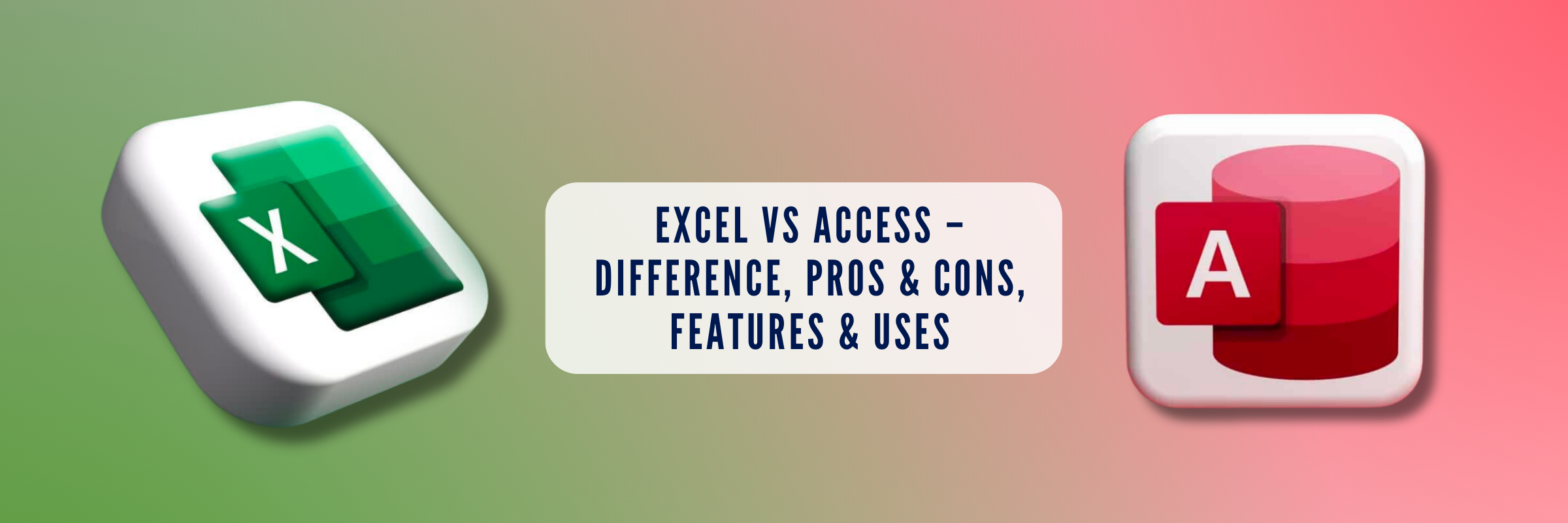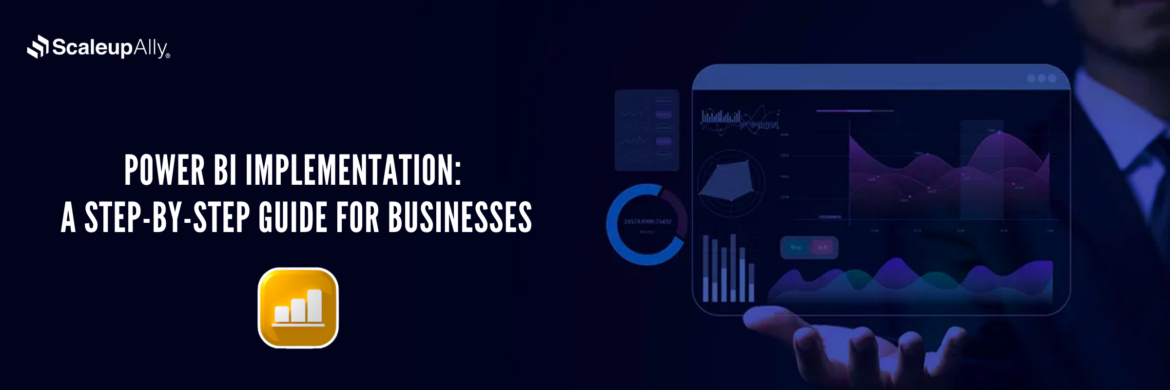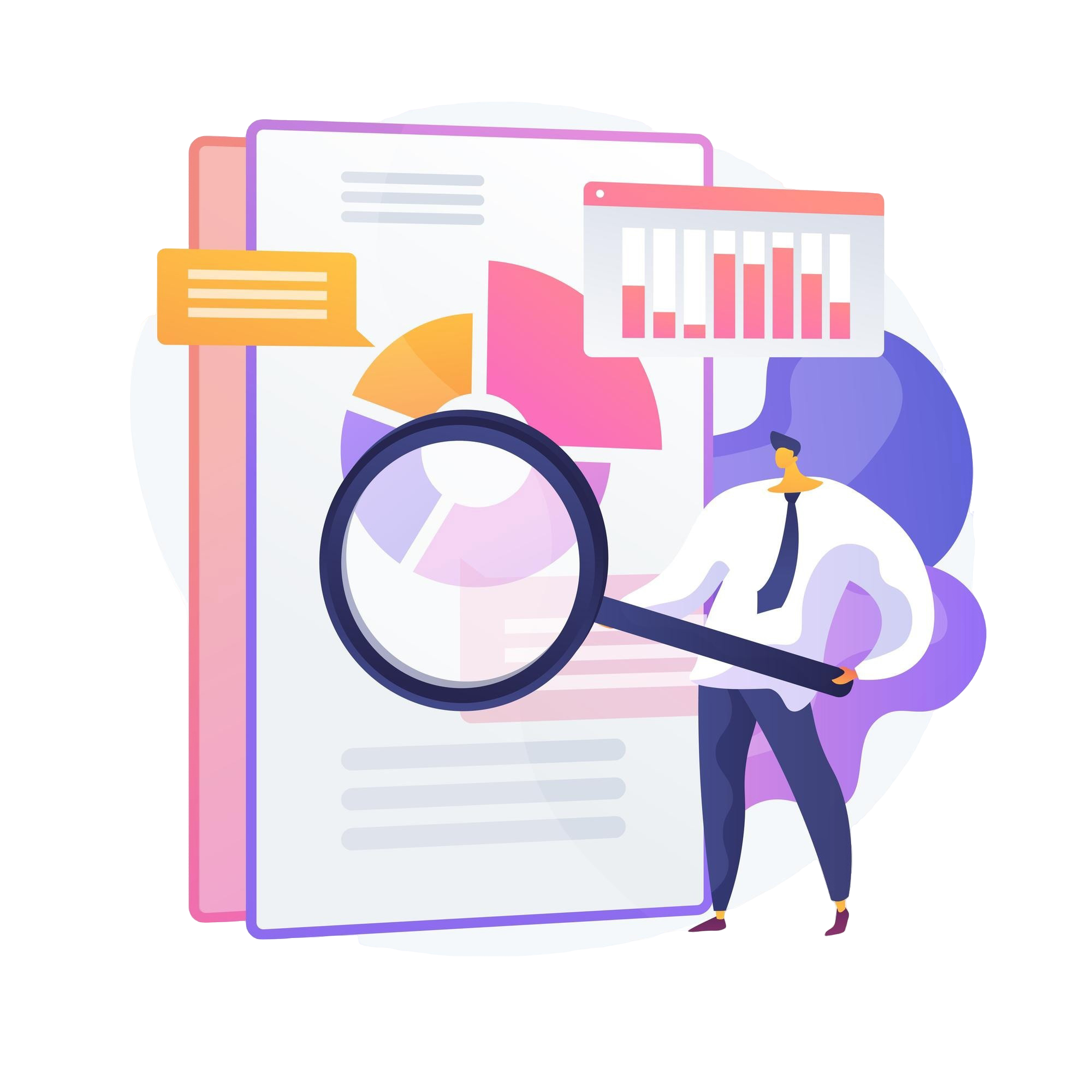
Excel vs Access: Which One Should You Choose?
Tarsem Singh | June 28, 2025 , 12 min read
Table Of Content
Trying to decide whether Microsoft Excel or Access is right for your data needs? This guide breaks down the pros, cons, and best use cases of both tools so you can choose the one that fits your workflow, data volume, and collaboration needs.
Key Takeaways
- Excel is ideal for data analysis, visualization, and calculations.
- Access is built for managing large datasets and creating database applications.
- Excel struggles with large datasets, while Access handles them efficiently.
- Both tools can complement each other for tasks like reporting or data migration.
- Your decision should depend on data complexity, user access needs, and intended use.
Difference Between Access and Excel: An Overview
- Difference Between Access and Excel: An Overview
- Detailed Comparison of Differences between MS Excel & MS Access
- What is Microsoft Excel?
- What is Microsoft Access?
- Features of Microsoft Excel
- Features of Microsoft Access
- Real Life Use Cases of MS Excel
- Uses of MS Access
- Pros & Cons of MS Excel
- Pros & Cons of MS Access
- MS Access vs Excel: Pricing Compared
- Which is better: Access or Excel?
- Can You Use Excel and Access Together?
- Conclusion
- Frequently Asked Questions
The main difference between Excel and Access is their purpose. Excel is a spreadsheet for calculations, analysis, and charts, ideal for smaller data sets. While Access is a database for storing large amounts of data organized and secure for multiple users.
Detailed Comparison of Differences between MS Excel & MS Access
While both MS Excel & MS Access are part of the Microsoft Office suite and are used for managing data, they have different purposes and features. Let’s take a look at a few differences, aka Access vs Excel:
| Feature | Microsoft Excel | Microsoft Access |
|---|---|---|
| Purpose | Spreadsheet program for data entry, calculation, analysis, and visualization | Database management system for creating and managing databases |
| Data Storage | Organized in worksheets with cells, rows, and columns | Organized in tables with records and fields |
| Data Analysis | Performs calculations, charts, and graphs | Creates queries, forms, and reports for data analysis |
| Complexity | Easy to learn and use | Requires some database knowledge and skills |
| Data Capacity | Limited to the amount of data that can be displayed in a worksheet | Can handle larger datasets but has its limits |
| Integration | Integrates with other Microsoft Office applications | Integrates with other Microsoft Office applications |
| Customization | Limited Customization options | High level of customization for forms, reports, and queries |
What is Microsoft Excel?
Microsoft Excel is a spreadsheet program developed by Microsoft in 1985 and has since come a long way. It features calculation, graphing tools, pivot tables, and a macro programming language called VBA (Visual Basic for Applications).
Excel is used for various purposes such as creating budgets, financial statements, charts, graphs, and analyzing data. It’s widely used in business, academia, and personal finance for its ability to organize and manipulate large amounts of data efficiently.
What is Microsoft Access?
Microsoft Access stores data as its primary job. Released in 1992 by Microsoft, it is a part of the Microsoft Office suite of applications and is designed to help users quickly create database applications for managing and analyzing large amounts of data.
Access allows users to create tables, queries, forms, and reports, making organizing and retrieving information easier. Small businesses and individuals often use it to create simple databases without the need for advanced programming knowledge.
Features of Microsoft Excel
Microsoft Excel has many features that make it useful for various tasks. Some of the key features include:
1. Spreadsheets
Excel is primarily used for creating and managing spreadsheets, which are grids of cells arranged in rows and columns. Each cell can contain text, numbers, formulas, or functions.
2. Formulas and Functions
Excel allows users to perform calculations using formulas and functions. Formulas can be simple calculations (e.g., adding two numbers) or complex calculations involving multiple cells. Excel includes various built-in functions for various tasks, such as mathematical calculations, date and time manipulation, and text manipulation.
3. Charts and Graphs
Excel includes tools for creating charts and graphs to visualize data. Users can create various charts, such as bar charts, line charts, and pie charts, to visually represent data and make it easier to understand.
Features of Microsoft Access
Microsoft Access as a database management system (DBMS), offers a variety of features for creating and managing databases. Some of the key features of Microsoft Access include:
1. Database Creation
Access allows users to create databases to store and organize information. Users can create tables to store data, define relationships between tables, and create queries, forms, and reports to interact with the data.
2. Tables
Access allows users to create tables to store data. Tables consist of rows and columns, with each column representing a field and each row representing a record. Users can define the data types for each field, such as text, number, date/time, etc.
3. Queries
Access includes a query designer that allows users to create queries to retrieve and manipulate data from tables. Users can create simple queries to retrieve data or more complex queries to perform calculations, join tables, and filter data.
Real Life Use Cases of MS Excel
Microsoft Excel is widely used in various industries and professions for many purposes. Here are some real-life examples of how Excel is used:
1. Financial Analysis
Excel is commonly used for financial analysis, such as budgeting, forecasting, and tracking expenses. For example, a financial analyst might use Excel to create a budget for a project, track actual expenses against the budget, and generate financial reports.
2. Data Management
Excel is used for managing large amounts of data, such as customer information, inventory records, and sales data. A sales manager might use Excel to track sales data, analyze trends, and make decisions based on the data.
3. Business Reporting
Excel is used for creating reports and presentations. Marketing managers use Excel to create a report on marketing campaign performance, including charts and graphs to visualize the data.
Uses of MS Access
Microsoft Access is a database management system that is commonly used for managing and analyzing large amounts of data. Here are some real-life examples of how Access is used:
1. Small Business Management
Access is used by small businesses to manage customer information, inventory, and sales data. Imagine a small retail store using Access to keep track of customer orders, manage inventory levels, and generate sales reports.
2. Student Information Systems
Access is used in educational institutions to manage student information, such as grades, attendance, and course schedules. For example, a school might use Access to track student grades, generate report cards, and manage class schedules.
3. Project Management
Access is used for project management tasks, such as tracking project timelines, managing tasks, and storing project documents. Think of a project manager using Access to create a database to track project milestones, deadlines, and budgets.
Pros & Cons of MS Excel
Microsoft Excel is a versatile tool with many advantages but has some limitations. Here are some pros and cons of using Excel:
Pros:
1. Ease of Use
Excel is user-friendly and easy to learn, making it accessible to users with varying levels of expertise.
2. Versatility
Excel can be used for various tasks, including data entry, calculation, analysis, and visualization.
3. Formulas and Functions
Excel includes a vast library of built-in formulas and functions for performing complex calculations and data analysis.
Cons:
1. Limited Data Capacity
Excel has limitations on how much data it can handle, which can be a problem for large datasets.
2. Complexity
While Excel is easy to use for basic tasks, it can be complex for more advanced operations, such as complex formulas or data analysis.
3. Security Concerns
If not properly secured, Excel files can be susceptible to security risks, such as unauthorized access or data breaches.
Pros & Cons of MS Access
Microsoft Access, like any software, has its strengths and weaknesses. Here are some of the pros and cons of using Microsoft Access:
Pros:
1. Ease of Use
Access is relatively easy to use, especially for users familiar with other Microsoft Office applications. It uses a graphical user interface that allows users to create databases without extensive programming knowledge.
2. Database Creation
Access makes it easy to create databases, tables, queries, forms, and reports, making it a comprehensive solution for managing and analyzing data.
3. Integration
Access integrates well with other Microsoft Office applications, such as Excel, allowing users to import and export data easily.
Cons:
1. Limited Capacity
Access has limitations in terms of the size of databases it can handle. Larger databases or databases with high transaction volumes may require a more robust database management system.
2. Performance
Access may not perform as well as other database management systems, especially with large datasets or complex queries.
3. Multi-User Support
While Access supports multiple users accessing a database simultaneously, it may not perform well with a large number of concurrent users.
MS Access vs Excel: Pricing Compared
Differences between Access and Excel’s prices are not much. They are available through Microsoft 365 subscriptions, which start around $6 per user per month for basic plans.
Access is typically included in higher-tier plans, such as Microsoft 365 Business Standard, while Excel is available in all plans.
Standalone versions can cost around $139.99 for Access and $149.99 for Excel, depending on the edition.
Which is better: Access or Excel?
| Scenario | Best Tool |
|---|---|
| Simple data entry and analysis | Excel |
| Managing large, relational datasets | Access |
| Creating charts, dashboards | Excel |
| Multi-user database access | Access |
| Automating report generation | Access |
| Financial modeling | Excel |
Choosing between Access and Microsoft Excel can be a tough call as both have advantages. They’re both great at storing large amounts of data, running queries and analysis tools, and performing complex calculations.
However, depending on what kind of data and tasks you have at hand, each program has its unique strengths. Access is particularly good at maintaining data integrity for multiple users, while Excel is better suited for in-depth analysis of numerical data.
There are times when combining both programs can be incredibly powerful. By using Access for data storage and Excel for analysis, you can take advantage of the strengths of both programs. It’s important to compare the benefits of each and learn when to use one over the other to achieve the desired results.
Can You Use Excel and Access Together?
Yes. Many workflows benefit from combining both tools:
- Use Access to store and manage data
- Use Excel to analyze that data and build visual reports
- Export/import between both tools seamlessly
Example: Use Access for CRM data and Excel for generating pivot charts.
Conclusion
Sometimes, using Excel and Access together can be helpful. For example, you might have created a complex Excel worksheet to analyze data, but now you need to share it with others. In this case, importing or linking your Excel worksheet into Access and using it like a database can be really useful. Or, maybe you already have data in an Access database and want to create some awesome Excel PivotTable reports and charts.
These flexible workflows highlight the relevance of MS Access today, especially for small to mid-sized businesses looking for lightweight database solutions.
No matter where you start, you can easily move data back and forth between Excel and Access to keep working. You can copy, import, or export data between the two programs, even if you don’t have a data connection.
If you want to learn more about how to exchange data between these programs, just let us know! Our team at ScaleupAlly is here to help you work more efficiently.
Frequently Asked Questions
Q: What is a query in Access?
A query in Access is a question you ask about your data. It allows you to retrieve specific data from your database based on criteria you specify.
Q: Can Excel be used for financial modeling?
Yes, Excel is commonly used for financial modeling due to its ability to perform complex calculations and create dynamic financial models.
Q: Can Excel be used for data visualization?
Yes, Excel includes a variety of chart types and formatting options that make it suitable for data visualization.
Q: Can Excel handle large datasets?
Not efficiently — Excel has performance limits with very large data volumes.
Q: Can I visualize Access data in Excel?
Yes. You can export Access data into Excel to create pivot tables and charts.
Q: Which tool is better for collaboration?
Access supports multiple users on a shared database more robustly than Excel.
Related Blogs

Power BI Cost: Comprehensive Guide to Pricing Plans
Compare different types of Power BI Licenses and their costs: Free, Pro, and Premium options explained. Discover which Power BI plan suits your business needs.
Tarsem Singh
Jun 30 ,
12 min read

Power BI Consultant Hourly Rates: How Much Does It Cost?
Struggling to understand the cost of hiring a Power BI consultant? Find out the Power BI consultant hourly rates, what factors influence the price and how to find the best value for your business.
Pranay Agrawal
Jun 30 ,
15 min read

Power BI Implementation: A Step-by-Step Guide for Businesses
Discover how to implement Power BI in your organization with this comprehensive guide. Learn essential steps and best practices for successful implementation.
Tarsem Singh
Jun 30 ,
12 min read









